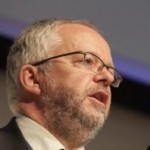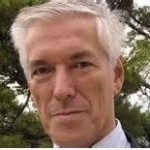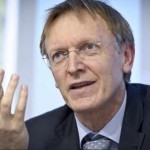Background
In early December, the European Environmental Bureau (EEB), an umbrella organization representing over 140 environmental citizens’ organisations across Europe, ran a conference celebrating its 40th anniversary. The title was, “Europe at the Crossroads: The Challenge of Environmental Sustainability.” It very soon became apparent that for many, likely most, of the environmentalists in attendance, it was more like we are stopped at a roadblock.
A crossroad offers you a choice of which direction you want to go. The choice may carry some anxiety but also some excitement, as it is a journey of discovery of new places. A roadblock is a barrier of some kind, often erected by officials of a government, which stops your progress. Sometimes you have to sit and wait until the barrier is cleared, sometimes you have to turn around and find another route, and sometimes the officials at the roadblock will not permit you to leave or change course.
The 2014 European election campaigns, and results, revealed varying degrees of distrust of the European Union (EU) and misgivings about further EU legislation and regulation, environmental as well as social-economical. There also remains deep anger, including violent protests, over the fiscal restraints that people blame on EU-wide and/or third-party institutions. Some stasis in most fields, including environmental, was expected, what John Hontelez referred to, in the context of an earlier period, as “reduced ambitions.” What the European environmental community may not have anticipated was that what it got was regression, not stasis, and it came from the President of the European Commission (EC) rather than from the Parliament, and it came swiftly and aggressively.
Context: Environmental Regression
On September 10, the newly elected President of the European Commission (EC), Jean-Claude Juncker (Luxembourg), announced his Commissioners and Vice-Presidents, and set the tone for his approach to various policies. The announced series of reforms and appointments stressing deregulation worryingly suggested a change of direction in the environmental field, a change toward a more business or industry friendly atmosphere at the center of the EU governance.
Some of the portfolios were “reshaped and streamlined.” The Commissioner for the Environment has been changed to now include environment, maritime affairs and fisheries, and the energy and climate portfolios have been joined in one Commissioner. Some saw this as a dilution of the various environmental policies that previously had the undivided attention of a Commissioner. On the other hand, the joined-up portfolios have a natural, logical connection and consolidation in tight fiscal times is not, on its face, unreasonable. Perhaps more disturbing, the “reshaping” looks suspiciously like an un-Greening of these policies as they all now have been given the responsibility to create jobs, stimulate growth and encourage investment. At the same time, there is no reciprocal direction to the economic and finance portfolios to also ensure only sustainable development or a Green or circular economy. The change was also unsettling on the eve of the climate talks in December in Lima and the critical Paris talks next year.
The Commission focus on “growth and jobs” dominates the discussion on plans for new legislative initiatives without any balancing for sustainable development, and only a passing reference to climate change. Of course jobs are critical to every community in the EU. “Growth” is different, depending on whether that growth comes from old-time neo-capitalism or new-age Green/circular-economy. The distinction makes a difference, and the Commission seems to favor old growth.
The Juncker policy announcements also called for First Vice-President Frans Timmermans (a new position) to review all pending legislative proposals and discuss them with Parliament and the Council to determine which to pursue, and which to drop. If all proposals are treated equally, such a review and discussion may not be threatening to environmental protection, although it does seem to be a particularly inefficient and bureaucratic start. The process of “re-considering” policies already developed through a laborious co-decision process undermines the regulatory process and the public confidence in its transparency. Wasn’t the recent election campaign filled with charges of inefficiency, duplication, and lack of transparency?
A particular concern in this regard is that the pending air quality package and circular economy package (focusing on reforms in waste area) seem to have been singled out for early and perhaps heightened review. The Clean Air Package would set more stringent pollution limits for each country, including for newly-covered pollutants such as finer particulate matter (PM2.5), thereby cutting 400,000 premature deaths every year to 58,000, with health benefits totaling €40-140 billion. The Circular Economy Package would increase recycling and phase out landfilling of certain recyclable materials, in the process creating 180,000 jobs in the EU. If this review were carried out, with a pulling back from environmental protections and Green circular economy, then the anti-environment signal from the new Commission would be quite clear. As we will see below, that is exactly what is happening.
In addition, Juncker has instructed his Commissioner for the Environment, Marine Affairs, and Fisheries, Karmenu Vella (Malta), to “review” the Birds and Habitat Directives to see if these two most critical pieces of EU legislation can be “modernized.” What does one make of the use of the term “modernize” as applied to a piece of environmental legislation? Presumably President Juncker has told the Commissioner what he meant. Perhaps it’s time he told the rest of us. In the meantime, we can surmise that “modern” would include something slim and trim and sleek, the kind of qualities that the business community likes to embrace. Of course, Commissioner Vella’s reputation in Malta as defender of economic development for tourism, without regard to environmental sustainability, did not bode well for this portfolio.
Finally, in assigning responsibilities to his Vice- Presidents, President Juncker neglected to include any responsibility for sustainability. The oversight, or insult, was so obvious that the outrage from the environmental and even business community led to an immediate correction whereby First Vice-President Timmermans (Netherlands) was given the added “horizontal responsibility for sustainable development,” whatever “horizontal responsibility” means. In any case, whatever it means, it is not part of Timmerman’s title and seems an afterthought, in contrast to the focus on jobs and growth which resides front and center in Juncker’s and Timmerman’s’ minds.
The EEB Conference
Covering a conference is never easy, and impossible to cover it all when the conference splits into parallel sessions and small group discussions. The most we can offer here is a sense of what was discussed at the conference, including some key issues that resurfaced at different moments. Over the next several months we will publish, in the Podcast section, videotape interviews with several speakers that will fill out a sense of the issues addressed at this important conference.
The recent developments within and announcements from the Commission dominated the conversation around the conference and some of the presentations, starting with the opening remarks by Mikael Karlsson, President of EEB. Karlsson kicked off the program with a robust challenge for the EU to continue with its global leadership on climate change policies and other key environmental legislation, and to continue working to protect Europe’s environment. Directly challenging the recent announcements from the Commission, he also stressed how research clearly demonstrates that environmental policies and programs, including resource efficiency and the circular economy, do not harm the economy but create jobs and sustain the environment. Deregulation is not the answer to job growth, as many within the business/industry lobby keep suggesting. Indeed, there is more of a need for environmental policies to drive sustainable development and job creation. While the current Commission might reasonably take a look at out-of-date policies and ways to streamline regulation, or cut red tape, it is not reasonable to try to cut out the core of the environmental policies and programs that have proven so successful over the past decades. Karlsson’s opening remarks were particularly apt since he then proceeded to introduce the first speaker, Karmenu Vella, the new Commissioner for the Environment, Maritime Affairs and Fisheries.
Commissioner Vella
Commissioner Vella began with the obligatory congratulations to EEB for their 40 years of service and their accomplishments over this period, including working with local citizen groups and their constructive criticisms. He even offered up praise of how the economy and environment can be integrated to help move the economy forward, implying the environment is subservient, and he relied on some unexplained and vague example of a project where tomatoes and fish were raised together. It was not long before his message became more directly oppositional to the assembled environmentalists. Harking back to his experiences heading up tourism in Malta, Vella spoke of Malta being the smallest state with the highest density in the EU where tourism brought 3 tourists for every citizen, with Euros to match. He bragged that he had pushed, against opposition, for a “sustainable tourism industry,” suggesting that maximizing tourism was his priority. Underlining his commitment to growth of industry, he argued that we need to focus on implementing what we already have and not on creating layer upon layer of environmental legislation undermining economic growth. Of course he failed to provide any research or even examples of how economic growth was undermined by environmental regulations. Vella then wound up his remarks with a set of exhortations, such as “Things are very different than 40 years ago when EEB started” (with whatever implication that was supposed to raise); President Juncker’s aim is for a Triple A rating for the European economy, and Vella hopes to aim for a Triple A for the environment (presumably measured by some industry standard); and that while the audience is committed to the environment, it also needs to be committed to Europe (some sort of veiled accusation of treason?). Then he abruptly shifted gears and ended by loudly proclaiming that he had no intention to undermine or weaken any environmental regulations. The promise sounded empty.
The Environmental Editor of The Irish Times, Frank McDonald, said a number of years ago that for the then Irish government “sustainable development” meant development that had to be sustained. McDonald’s characterization seems fitting for Commissioner Vella and what appears to be the direction of the new Commission.
Vella’s speech was followed by a presentation by John Hontelez, a former EEB Secretary General and now Chief Advocacy Officer at Forest Stewardship Council. Hontelez’s remarks were not directed specifically at what Vella had said but they served as an analysis of how environmental efforts have developed over the past 40 years, and as an effective rebuttal to some of the attitudes that seem to underlie the new Commission.
John Hontelez
In the early stages of the EU, many were initially suspicious of the European Commission, and hopeful that national governments would accomplish more on environmental matters. Yet the EU and Commission developed over the years since the 1972 Stockholm Conference with environmental issues integrated with socio-economic matters and with a single economic market. Hontelez reviewed how the Commission has always served two conflicting agendas, at times bringing governments to court to support industry against national measures, as when Denmark introduced a ban on cans, and at times trying to integrate environmental objectives into the economy, as with its CO2/energy tax proposal in 1992 and with producer responsibility programs in certain sectors (cars, and electric and electronic equipment). Unfortunately, Hontelez pointed out, recent events suggest that such success stories may be fewer and farther apart. While in the past a group of frontrunner countries, with progressive politics, drove EU environmental policies, enlargement of the EU, along with intense global competition, has led to the lowest denominator driving policies. Current EU environmental polices are now seen as a ceiling rather than a floor. The frontrunners have largely disappeared, with the exception of Sweden, according to Hontelez. With the push from business and industry for deregulation, importantly he noted that prior reports he has written indicate that EU environmental policy causes less than 1% of the total administrative burden of EU policies. Hontelez urged an even greater leadership role for the EEB in pushing back and protecting our shared environment.
Following Hontelez’s presentation was a panel debate on the last 40 years of EEB work. Ludwig Kramer, Director of Client Earth’s EU Aarhus Centre, and a long-time defender of the environment, offered a spirited and lucid direct rebuttal to Commissioner Vella and the new Commission. Acknowledging that the EEB, and environmental movement in general, had been largely successful in raising and pushing the environmental agenda, and passing legislation that affected 28 countries, Kramer admonished that the legislation was not being implemented in all 28 countries and remained like the 10 Commandments — praised but not followed.
Ludwig Kramer
On the need to balance and integrate environmental and economic policies, Kramer’s concern is that economics continues to operate to the exclusion of the environment and that President Juncker and the new Commission appear focused solely on economic growth, aided by the recent elections and pushed by the vested interests of industry and business. Kramer further emphasized that he found it disturbing that the new Commission, acting much like a closed society, was thinking about, and likely planning on, withdrawing the air protection package when hundreds of thousands of EU citizens are dying from air pollution every year.
In the discussion period, John Hontelez added a few comments, suggesting that to counter any regression on the part of the Commission, environmentalists need to make alliances with wider society, not just with eNGOS and politicians. He mentioned companies involved with producer responsibility programs, progressive industries, and trade unions, which were key to developing REACH.
The second module looked at the next 40 years and the role of sustainability in EU policies with eight speakers, including Achim Steiner, UNEP, by video. President Juncker was invited but declined, as did First V-P Timmermans. Hans Bruyninckx, EEA, and Kirsten Brosbøl, Danish Environment Minister, stressed the need to see that the 7th Environment Action Programme (EAP) is fully implemented before 2020, especially since the 7th EAP is legally binding on the Commission as on others. Other speakers stressed the broad support in surveys among the EU citizenry for environmental programs and protections, something that the Commission needs to be constantly reminded of. Kathleen Van Brempt MEP (Belgium) reminded the audience that she needed help in addressing the concerns of a Parliament that was going to be subject to pressure from newly elected members especially those on the right who did not favor environmental policies. Thomas Becker of the European Wind Energy Association discussed the Energy Union, a policy that the Commission favors and environmentalists can support. While the Energy Union is unclear, that very quality opens up possibilities for controlling the supply and security of energy, and the possibility of pushing for decarbonization relying on indigenous, renewable resources. He also stressed the need for a EU-wide energy market instead of 28 individual energy ministers.
Kathleen Van Brempt
David Baldock, Institute for European Environmental Policy, offered an upbeat presentation. He first paid tribute to the EEB especially for its providing a platform, and a voice, for many smaller eNGOs over the years. Baldock also argued that there is little evidence across the broad EU community of any wish to roll back environmental protections, including within the UK, and most businesses and industry favor retaining what everybody has worked so hard to achieve. As an example he pointed out the long struggle to form and reform the Common Agricultural Policy (CAP) and that it has delivered a significant number of positive environmental benefits. Besides profits, companies want certainty and consistency and most have adjusted to environmental regulation. He also stressed that higher environmental standards, even for new EU Members, do not inhibit economic growth and there is no evidence that regulation is harmful to the economy.
In the discussion period following this second module, Van Brempt pointed out that President Juncker is responding, in part, to public opinion that thinks there is too much regulation which few understand, e.g., with the shape of olive oil bottles and types of vacuum cleaners. She is optimistic that Juncker will be convinced finally of the need for complex environmental regulation. Baldock agreed, in part, suggesting that Juncker is worried that the EU is headed like Japan and that a heavy burden of environmental regulation is costing the economy, especially energy sector, although there has been little or no data or independent studies to support this position. Hans Bruyninckx added that the public, and Commission, need more data on the health costs of a lack of regulation and the impacts on quality of life standards if pollution is not controlled. He urged action, not more science, citing the three extreme storms that Copenhagen has experienced in the last 5 years.
In the question and answer period, one participant noted that in the UK there are 400,000 members in political parties and over one million members in the Royal Society for the Protection of Birds. Time to rally these human resources!
Module 3 focused on “Elements of a sustainable transition” with Connie Hedegaard, former EU Commissioner for Climate Action, leading the way. She felt there is a paradigmatic shift coming with the adoption of more targets and more pricing mechanisms, and active involvement of institutions such as OECD and the World Bank in climate change actions. She also echoed others in arguing that most businesses understand that EU-wide regulation is much better than 28 widely different regulatory regimes, a point that is clear to US businesses as well. She also was rousing everybody to start naming and shaming bad environmental actors, organize ordinary citizenry, and talk about values and morals as much about consumption.
Connie Hedegaard
Simon Upton of the OECD argued that incremental change is no longer enough, business as usual is not an option, but that’s exactly what we will get unless some crisis loosens this grip. Part of that grip comes from the fact that government revenues still rest heavily on oil and natural gas, with 12% in OECD, 58% in OPEC amd 30% elsewhere. Technology over the past 20 years has done what it needed to do, and the problem was now “simply” a matter of policy or will power. He also referred to a study by OECD in April 2014 on the costs of regulation on business.
In the discussion afterward, Upton added that if regulations protect current stakeholders, we need to revise them to break the grip of those locked-in to benefits. Hedegaaard also agreed with Upton that we need politics because the market does not work for our purposes and while we do need growth it has to be a different kind of growth from the past.
In the afternoon there were also a series of parallel Breakout Sessions, covering the Economy and environment; Europe in the wider world; Democracy, accountability and rule of law; the climate crisis; threat to nature; and, the threat to health. At the end of the day, rapporteurs summarized the discussion at each Breakout session.
On the second day, there was a general session with a Keynote Speech by Janez Potocnik, former EU Commissioner for the Environment. The Commissioner suggested that in light of developments in China, the US, and even India, it was no time for the EU leaders to reverse course on climate and other polices if the EU wanted to retain its well-earned credibility on global climate issues.
Janez Potocnik
Potocnik pointed out that what is needed is clear thinking on a circular economy and resource efficiency. Markets need clear rules to function properly, not unlike football matches. Some of the obstacles to such progress, for Potocnik, are human behavior, suggesting we are able to protect future generations at home but are unable to do the same in the public policy arena; failure to engage in long-term planning; and difficulty in breaking lock-ins, or to help those who will lose out in changes to a sustainable future. Unanswered in this last point is whether Potocnik thinks we should take care of the likes of Exxon Mobil or the Koch Brothers when they start to lose out in the switch to a fossil-free environment and economy.
In the question and answer period, Potocnik encouraged the environmental community to push for access to justice, and inspections and legal oversight at the national level because relying on EU intervention might be less available than before. He also urged the audience to lobby the Council and Parliament if or when the Commission turned reactionary on environmental matters.
Following this general session, there were “world café” discussions among small groups on a variety of topics, including Key strengths and weaknesses of the environmental movement in Europe; Building alliances with kindred spirits; Reaching out to the wider public; and, Getting through to decision makers.
Conclusion
Some speakers suggested that the early pronouncements by a new President and Commission may be playing to certain audiences (partly business, partly Euroskeptics perhaps) and do not necessarily reflect a planned assault on environmental protection efforts in the EU. Juncker’s experience, expertise and primary interest is in finance and it dominates his Agenda for Jobs, Growth, Fairness, and Democratic Change, and the Ten Policy Areas. He is also fond of repeating: the EU will take care of the big issues and then leave the small things for the Member states. This mantra is simplistic and we never get a sense of the criteria that will differentiate the Big from the Small.
Any optimism was quickly crushed just over a week after the conference when the Commission kept its word to propose a withdrawal of the pending air quality and circular economy legislative packages in its 2015 Work Programme.
The reaction was swift. On word that the Commission was considering this action, Ministers from 11 EU states, including Germany and France, wrote to the Commission to object, and Green 10, a group of some of the larger eNGOs in the EEB, wrote to V-P Timmermans pointing out the loss of life and jobs and harm to the environment if the air and waste packages were withdrawn.
The wide-spread criticism had an effect. At the moment it looks like the Air Quality package is being repackaged. Instead of outright withdrawal, it will be “modified” or adapted as part of the 2030 energy and climate package. Of course skepticism remains high that this is just a stalling tactic and that a substantial watering down of the air package is in the offing. The Circular Economy package on waste seems more at risk for being withdrawn and put off for a “broader”, most would read as weaker, approach in 2015.
At the beginning we suggested several choices for people finding themselves stopped by a roadblock. One choice was predicated on the power of the officials at the roadblock to refuse permission to leave or change direction. It needs to be made clear that the EU President, his Commissioners, and their policies cannot stop those who believe in a better direction. There remains a Parliament and Council. And we should not forget the European Environment Agency (EEA), an independent body, which just recently produced reports on the continuing air and waste problems in the EU. Equally important there remains public opinion.
When President Ronald Reagan first took office in 1981, he tried to dismantle the US Environmental Protection Agency by appointing industry supporters to the highest ranks of EPA, gutting its finances, and implementing polices that undermined environmental and health protections, including at a toxic waste site called Times Beach Missouri where dioxin had led to the evacuation of an entire town. The public, informed by an active press and an aggressive body of local and national eNGOs, rose in opposition and Reagan had to replace the industry-friendly EPA officials and appoint a widely-respected official to resurrect the reputation, and work, of the EPA.
If the Commission persists in maintaining its roadblock, there is a need to raise an alarm for other travelers about the implications of the barrier: who raised it, why was it raised, how was it raised, who is paying for it, and how it can be dismantled.
Vigilance and action is called for. The EEB 40th anniversary conference was quite timely in reminding us of this basic principle.
Sources
European Commission, The Juncker Commission: The Right Team to Deliver Change (10 Sept 2014). Speech by President Juncker. europa.eu/rapid/press-release_SPEECH-14-585_en.htm
European Commission Press Release, The Juncker Commission: A strong and experienced team standing for change (10 Sept 2014). europa.eu/rapid/press-release_IP-14-984_en.htm
President Juncker’s Mission Letter to Frans Timmermans (1 Nov 2014). ec.europa.eu/commission/sites/cwt/files/commissioner_mission_letters/timmermans_en.pdf
Merriam-Webster, “Roadblock.” www.merriam-webster.com/dictionary/roadblock
European Commission, A New Start: The 2015 Work Programme (16 Dec 2014). ec.europa.eu/priorities/work-programme/index_en.htm
“EU plans to scrap laws on clean air and waste recycling,” The Guardian (11 Dec 2014). www.theguardian.com/environment/2014/dec/11/eu-plans-to-scrap-clean-air-and-waste-recycling-laws
Green 10 to Timmermans: “Do Not Killl Laws Crucial For Our Health, Environment and the Economy” (11 Dec 2014). www.eeb.org/index.cfm/news-events/news/green-10-to-timmermans-e2809cdo-not-kill-laws-crucial-for-our-health-environment-and-the-economye2809d/
Green 10, “Axing of waste proposals and uncertainty about air a colossal strategic blunder,” Press Release (16 Dec 2014). www.eeb.org/EEB/index.cfm/news-events/news/axing-of-waste-proposals-and-uncertainty-about-air-a-colossal-strategic-blunder/
Arthur Neslen, “EU backs down on plans to axe waste and air quality directives,” The Guardian (16 Dec 2014) www.theguardian.com/environment/2014/dec/16/eu-backs-down-on-plans-to-axe-waste-and-air-quality-directives
Robert Emmet Hernan, “Times Beach Missouri,” in This Borrowed Earth: Lesson From the 15 Worst Environmental Disasters Around the World (Palgrave Macmillan, in English, 2010; China Machine Press, in Chinese, 2011).
European Environment Agency, Waste prevention in Europe – the status in 2013, on decoupling waste generation from economic growth (December 2014). www.eea.europa.eu/publications/waste-prevention-in-europe-2014/
European Environment Agency, Air quality in Europe – 2014 report (November 2014). www.eea.europa.eu/publications/air-quality-in-europe-2014










No comments yet, add your own below